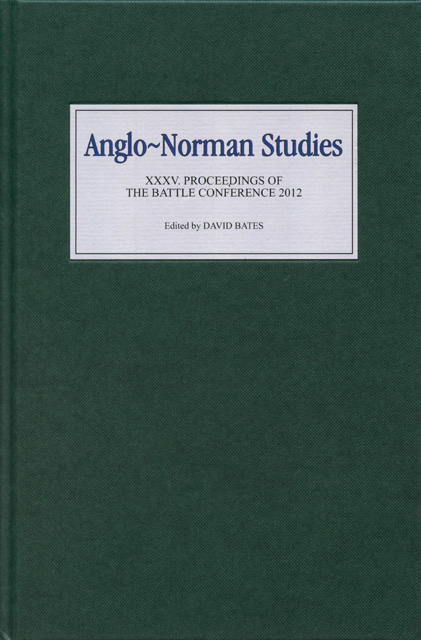Book contents
- Frontmatter
- Dedication
- Contents
- List of Illustrations and Tables
- Editor’s Preface
- Abbreviations
- A Three-Cornered Dynamic of Redemption in the ‘Long’ Thirteenth Century: Villein Manumissions and the Theology of the Incarnation (The R. Allen Brown Memorial Lecture, 2011)
- Femmes en religion, personnes d’autorité: les abbesses normandes (XIe–XIIIe siècles) (The R. Allen Brown Memorial Lecture, 2012)
- The Role of the Curator of the Bayeux Tapestry
- Early Normandy
- The Norman Conquest, Countess Adela, and Abbot Baudri
- Baldric of Bourgueil and the Flawed Hero
- John Bilson (1856–1943) and the Study of Anglo-Norman Romanesque
- The Identity of the Designer of the Bayeux Tapestry
- The Pseudo-Hugh Falcandus in His Own Texts
- The Thirteenth-Century Chronique de Normandie
- Les investitures abbatiales en Normandie: quelques réflexions autour du cas de l’abbaye du Bec-Hellouin (1034–1136)
- Robert Curthose: The Duke Who Lost His Trousers
- Sufficientia: A Horatian Topos and the Boundaries of the Self in Three Twelfth-Century Poems
- Aristocratic Acta in Normandy and England, c. 1150–c. 1250: The Charters and Letters of the Du Hommet Constables of Normandy
- Crime without Punishment: Medieval Scottish Law in Comparative Perspective
- Landscape and Belief in Anglo-Norman England
- Contents of Volumes 1–34
A Three-Cornered Dynamic of Redemption in the ‘Long’ Thirteenth Century: Villein Manumissions and the Theology of the Incarnation (The R. Allen Brown Memorial Lecture, 2011)
Published online by Cambridge University Press: 28 February 2023
- Frontmatter
- Dedication
- Contents
- List of Illustrations and Tables
- Editor’s Preface
- Abbreviations
- A Three-Cornered Dynamic of Redemption in the ‘Long’ Thirteenth Century: Villein Manumissions and the Theology of the Incarnation (The R. Allen Brown Memorial Lecture, 2011)
- Femmes en religion, personnes d’autorité: les abbesses normandes (XIe–XIIIe siècles) (The R. Allen Brown Memorial Lecture, 2012)
- The Role of the Curator of the Bayeux Tapestry
- Early Normandy
- The Norman Conquest, Countess Adela, and Abbot Baudri
- Baldric of Bourgueil and the Flawed Hero
- John Bilson (1856–1943) and the Study of Anglo-Norman Romanesque
- The Identity of the Designer of the Bayeux Tapestry
- The Pseudo-Hugh Falcandus in His Own Texts
- The Thirteenth-Century Chronique de Normandie
- Les investitures abbatiales en Normandie: quelques réflexions autour du cas de l’abbaye du Bec-Hellouin (1034–1136)
- Robert Curthose: The Duke Who Lost His Trousers
- Sufficientia: A Horatian Topos and the Boundaries of the Self in Three Twelfth-Century Poems
- Aristocratic Acta in Normandy and England, c. 1150–c. 1250: The Charters and Letters of the Du Hommet Constables of Normandy
- Crime without Punishment: Medieval Scottish Law in Comparative Perspective
- Landscape and Belief in Anglo-Norman England
- Contents of Volumes 1–34
Summary
This article investigates the three-cornered transaction by which a merciful God contrived to defeat and destroy the power of Satan over humankind by permitting the Incarnation of His Son as a human but sinless being who could then offer himself up to suffer an unmerited crucifixion. It examines, in particular, an unexpected parallelism between this and the three-sided dynamic of villein manumissions in the English countryside of the ‘long’ thirteenth century. I am, as I fear I shall show below, no theologian. I noticed the analogies between the two processes very much by chance in the course of studying villeinage and manumissions. Once seen, this odd structural similarity seemed to me unlikely to be a mere coincidence, and I marked it down as something worthy of study in due course. At the very least, the dynamics of each process must have something to contribute to our understanding of the other, whichever way the influence might run.
I propose here to see how far I can progress on the questions raised by the parallels, to bring them to the notice of scholars in both areas. I shall first sketch in brief what I have learned about villein manumission in the course of compiling over many years a corpus of documented examples. I then endeavour, as well as a non-specialist may, to examine and display the challenge posed by the New Testament account of the life, death, and resurrection of Jesus for early medieval churchmen, and show how they met this with the help of their legacy from the Fathers of the Early Church. And finally I shall ponder what we can make of the findings as I see them, and where they might lead.
Manumission from Servitude in Medieval England
Previous scholarship on this subject is good but old; it has seldom interested recent historians of either the peasantry or the law. The curious would simply find that it was, in any case, a relatively rare event. Villein status being hereditary, most unfree families remained unfree until the whole system of hereditary servitude began in some mysterious way to fade out in the later Middle Ages. It was certainly possible for lords to free villeins and their families.
- Type
- Chapter
- Information
- Anglo-Norman Studies 35Proceedings of the Battle Conference 2012, pp. 1 - 16Publisher: Boydell & BrewerPrint publication year: 2013



